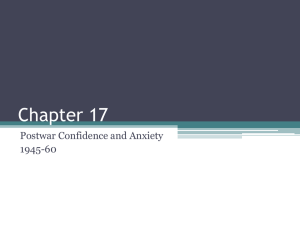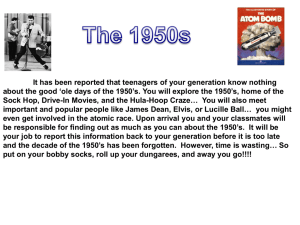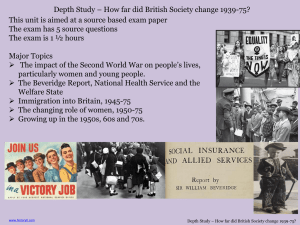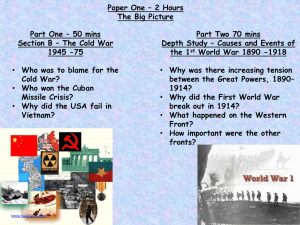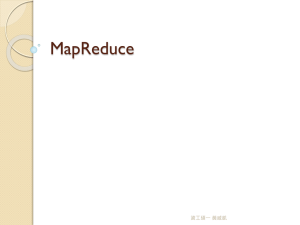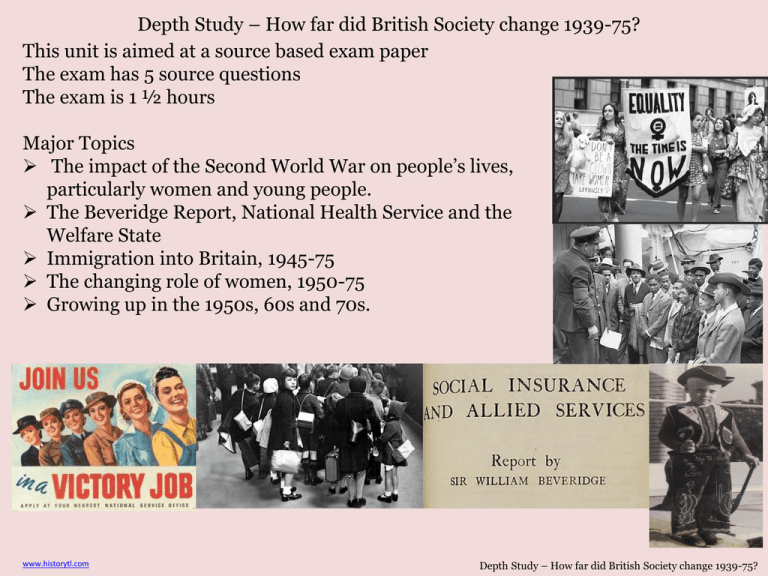
Depth Study – How far did British Society change 1939-75?
This unit is aimed at a source based exam paper
The exam has 5 source questions
The exam is 1 ½ hours
Major Topics
The impact of the Second World War on people’s lives,
particularly women and young people.
The Beveridge Report, National Health Service and the
Welfare State
Immigration into Britain, 1945-75
The changing role of women, 1950-75
Growing up in the 1950s, 60s and 70s.
www.historytl.com
Depth Study – How far did British Society change 1939-75?
Depth Study – How far did British Society change 1939-75?
Our Topic
The changing role of women, 1950-75
What was life like for most women in the 1950s?
How were women discriminated against in the 1960s and
early 70s
What factors led to the changes in the roles of women
How much change had taken place by 1975?
The changing role and the contribution of women during the Second World
War, for example, civil defence, the land army, factory work, joining the
armed forces and looking after families.
The impact of these changes after the war.
Women in the 1950s. Discrimination in the 1960s and early 1970s.
The impact of the introduction of the Pill, the ‘women’s lib’ movement.
Abortion. The 1969 Divorce Law Reform Act, the 1975 Sex Discrimination
Act.
The extent of the progress made by 1975.
www.historytl.com
Depth Study – How far did British Society change 1939-75?
Depth Study – How far did British Society change 1939-75?
The changing role of women, 1950-75
1971 Women make up 38%
of the workforce
52% of women worked
1967 The Abortions Act
passed
1951Women make up 31%
of the workforce
36% of women worked
1961 The Contraceptive pill
available on the NHS
1969 Germaine Greer
published ‘The female
Eunuch
1955 Equal pay in public
sector jobs
1940
45
50
55
60
65
70
1975
1970 Equal Pay Act
1970 Women's Liberation
Movement Set up
Demands
Equal pay
Equal education
24 hour nurseries
Free contraception and
abortion on demand
www.historytl.com
Depth Study – How far did British Society change 1939-75?
The changing role of women, 1950 -75.
What was the impact of the Second World War on the lives of
Women?
Objectives
To investigate the
change in attitudes
towards women due to the
Second World War
To come to a judgement
on the level of change.
Describe the
women in the
poster.
http://www.youtube.com/watch?v=0k3GTW3ecvo
Material girl
Source A - Poster for the
Labour Exchange 1939
www.historytl.com
Depth Study – How far did British Society change 1939-75?
The changing role of women, 1950 -75.
What was the impact of the Second World War on the lives of
Women?
What can we learn about the role of women in the war from Sources A and B
British women officers often give orders
to men. The men obey smartly and know
it is no shame. For British women have
proved themselves in this war. They have
stuck to their posts near burning
ammunition dumps, delivered messages
on foot after their motorcycles have been
blasted from under them. They have
pulled aviators from burning planes.
There is not a single record of any British
women in uniform quitting her post or
failing her duty under fire. When you see
a girl in uniform with a bit of (medal)
ribbon on her tunic, remember she didn’t
get it for knitting more socks than anyone
else in Ipswich.
Source A - Poster for the
Labour Exchange 1939
Source B -A US War
department booklet for
American soldiers coming to
Britain 1942
www.historytl.com
Depth Study – How far did British Society change 1939-75?
Did attitudes to women change because of the Second World War?
Sort out your evidence into three groups, YES, NO ,NOT SURE
In 1941 , all women aged twenty or older had
to register for war work. Most were sent to
work in industry or the auxiliary armed
forces.
Many of the tasks done by women were
broken down into simpler tasks as some
men thought women could only do simple
work
By 1945, 80% of married women and 90% of
unmarried women were working in industry
o9r the forces.
Although women worked in the armed
forces, these were mostly supportive roles
and not on the front line.
By 1943 over 443,000 women were working
in the armed forces.
Trade Unions accepted female workers much
more happily than they had in the First
World War.
Many older women managed to continue to
working to help British industry recover
from the war.
In 1947 18% of married women worked
compared to 10% in 1939
Millions of women still had to juggle working
in factories and looking after their families.
Often flexible hours or nurseries were
introduced
Many younger women stopped working to
have children, this was encouraged by the
media and certain sections of society.
Much of the work was only available during
the war and stopped in 1945
In 1945 there was a sudden increase in the
amount of marriages.
‘Glamorous’
recruitment
poster
1941
Photograph –Women protesting about the
lack of nurseries during the war
Photograph –Women working in the Land
Army during the war
Recruitment poster 1941
The changing role of women, 1950 -75.
What was the impact of the Second World War on the lives of
Women?
In pairs categorise the evidence into
Evidence of change in attitude
Evidence of no real change in attitude
Now prioritise your sets of slips from best to worst evidence
Complete
There is evidence that attitudes did change……..
(using your best pieces of evidence)
There is evidence that attitudes did change……..
(using your best pieces of evidence)
In conclusion I think there was/was not a change
www.historytl.com
Depth Study – How far did British Society change 1939-75?
The changing role of women, 1950 -75.
What was the impact of the Beveridge Report , the introduction of
the National Health Service (NHS) and the start of the Welfare State
on the lives of women?
Objectives
To investigate the
changes induced by the
Government after the war
To evaluate the impact
of these changes on the
lives of women
Cartoon –fighting the five ‘giants’ of poverty
www.historytl.com
Depth Study – How far did British Society change 1939-75?
The changing role of women, 1950 -75.
What was the impact of the Beveridge Report , the introduction of the National Health Service
(NHS) and the start of the Welfare State on the lives of women?
Title – The Beveridge Report
Using the Understanding
history books, identify the five
‘giants’ of poverty.
Write one sentence explaining
how each could cause poverty.
Read pages 126/7 match up the
new proposals suggested to
solve these five issues
Cartoon –fighting the five ‘giants’ of poverty
Explain what the Welfare State
was?
Explain how it would be
funded?
Do you think these changes will
change the lives of women/
Give two reasons to support
your answer
www.historytl.com
http://www.youtube.com/watch?v=Tymq5CefW-E Start of NHS
Depth Study – How far did British Society change 1939-75?
The changing role of women, 1950 -75.
Impact on the lives of women
Beveridge
Report
NHS
Welfare State
www.historytl.com
Depth Study – How far did British Society change 1939-75?
The changing role of women, 1950 -75.
What was the impact of the Beveridge Report , the introduction of
the National Health Service (NHS) and the start of the Welfare State
on the lives of women?
Plenary – Explain how the lives of women were improved after the war,
use specific examples from your tree map.
One reason for improvement was
Another reason for improvement was
A final reason for improvement was
www.historytl.com
Depth Study – How far did British Society change 1939-75?
The changing role of women, 1950 -75.
What was life like for most women in the 50s?
Using Source A and B
What can you learn about life for women in the 1950s?
You have until the end of the song to answer the question
Source A – A housewife in the
1950s
www.historytl.com
http://www.youtube.com/watch?v=mIwa9sPFT5I
Whistle while you work
Source B – 1950s
advertisement for Tea
Depth Study – How far did British Society change 1939-75?
The changeing role of women, 1950 -75.
What was life like for most women in the 50s?
Objectives
To investigate life
women in the 1950s
To understand the
attitudes and limits at the
time
To put forward
suggestions for change
www.historytl.com
Depth Study – How far did British Society change 1939-75?
The changing role of women, 1950 -75.
What was life like for most women in the 50s?
‘In the 1950s women were expected to stay at home’
Do sources 1-6 agree with this statement? P 470/471
In pairs complete table below
Source
Nature
Origin
Purpose
Agrees/
Disagrees
(evidence)
Useful?
One reason
Limited in
Use
one reason
1
2
3
4
5
6
Chose the three most useful sources to support your answer,
highlight them on your table and give a reason for your choice.
www.historytl.com
Depth Study – How far did British Society change 1939-75?
The changing role of women, 1950 -75.
What was life like for most women in the 50s?
‘In the 1950s women were expected to stay at home’
Do sources 1-6 agree with this statement? P 470/471
Now write a short answer to the question (2/3 of a side)
Structure.
There are sources that agree (2 examples)
There are sources that disagree ( 2 examples)
In conclusion The sources do/do not agree with the
statement because…
www.historytl.com
Depth Study – How far did British Society change 1939-75?
The changeing role of women, 1950 -75.
What was life like for most women in the 50s?
Plenary
If you wished to change the role of women at this time, what three new
laws would you introduce?
Suggested Law…..
Hoped for change….
Suggested Law…..
Hoped for change….
Suggested Law…..
Hoped for change….
www.historytl.com
Depth Study – How far did British Society change 1939-75?
The changing role of women, 1950 -75.
How were women discriminated against in the 1960s and 1970s?
Objectives
To investigate examples
of discrimination
To continue to practise
source skills.
www.historytl.com
Depth Study – How far did British Society change 1939-75?
The changing role of women, 1950 -75.
How useful is Source F in explaining the level of discrimination in the 1960s
and early 70s?
Explain the example of discrimination
What is the Nature Origin and Purpose of the source
Does the N/O/P make the source more or less useful?
Give an example for each side
www.historytl.com
http://www.youtube.com/watch?v=FjJs_Wk_cIY
Sunday Stripper
Depth Study – How far did British Society change 1939-75?
The changing role of women, 1950 -75.
How were women discriminated against in the 1960s and 1970s?
Categorise your slips into evidence of
Continued discrimination.
Improvements to the working lives of women.
Prioritise your evidence
Copy the top two examples for each side
www.historytl.com
Depth Study – How far did British Society change 1939-75?
Women were more able to get a
job if they wanted one at this time.
A shortage of workers increased
the demand for women to work
Wages increased faster then prices
so there was more spending
money available.
For married women the main
wage could cover the family bills
1951 31% of the workforce was
made up of women, by 1971 this
rose to 38%
1951 36% of adult women were
working by 1971 this rose to 52%
Gradual end of the ‘marriage bar’,
the unwritten rule that women
gave up work when they married.
Women were still resented by
many male colleagues in the work
place.
Working mothers were blamed
for crime and unruly behavior by
children.
Negative attitudes meant working
women generally took lower paid
and lower status jobs
Male colleagues often thought
women were less committed and
would burst into tears under
pressure.
Even when women were doing the
same job as men they were paid
less.
Women rarely gained promotion
for management positions
Study source E and F
Which of these sources gives a more accurate view of the position of women
in Britain in the late 1960s and early 1970s?
Use details from the source and your own knowledge (the examples you have just used) to explain
your answer (8 Marks)
The changing role of women, 1950 -75.
What factors led to the changes in the role of women?
Objectives
To investigate the
factors that helped
changed the role of
women
To evaluate the relevant
factors
To come to a conclusion
as to how far these factors
had changed the roles of
women
www.historytl.com
http://www.youtube.com/watch?v=fUspLVStPbk
Every sperm is scared
Depth Study – How far did British Society change 1939-75?
The changing role of women, 1950 -75.
What factors led to the changes in the role of women?
There are five factors that
helped change the role of
women.
For each find out what it was,
add to your diagram
Find out two ways it helped
change the role of women
Introduction of
the Pill
Factors that
led to the
changes in
the role of
women
1967 Abortion
Act
1969 Divorce
Law Reform
Act
You will have six minutes
per factor and will visit
three, your pair will also
visit three. Decide who is
going where now.
1975 Sex
Discrimination
Act
1970 Equal Pay
Act
www.historytl.com
Depth Study – How far did British Society change 1939-75?
The changing role of women, 1950 -75.
What factors led to the changes in the role of women?
There are five factors that
helped change the role of
women.
For each find out what it was,
add to your diagram
Find out two ways it helped
change the role of women
Introduction of
the Pill
Factors that
led to the
changes in
the role of
women
1967 Abortion
Act
1969 Divorce
Law Reform
Act
Prioritise the factors
Which two made the
most difference do you
think? Give specific
evidence to support
your answer
Which made the least
difference?
1975 Sex
Discrimination
Act
1970 Equal Pay
Act
www.historytl.com
Depth Study – How far did British Society change 1939-75?
What factors led to the changes in the role of women?
Introduction of
the Pill
Factors that
led to the
changes in
the role of
women
1967 Abortion
Act
1969 Divorce
Law Reform
Act
1975 Sex
Discrimination
Act
1970 Equal Pay
Act
What is the message of this source?
The changing role of women, 1950 -75.
What was the role of the Women’s Liberation Movement in changing
the role of women??
Objectives
To investigate the role
of the Women’s
Liberation Movement in
changing the role of
women
Draw and label a Feminist
You have until the end of the
song
To compare this factor
with ones from last lesson
To come to a judgement
as to the importance of
the Women’s Liberation
Movement
http://www.youtube.com/watch?v=4o8-1Zfop94&list=PLkz2fbCIjPkItp1pMRtytu0WPeyL18s9R
Just A girl
www.historytl.com
Depth Study – How far did British Society change 1939-75?
The changing role of women, 1950 -75.
What was the role of the Women’s Liberation Movement in changing
the role of women??
At a National Conference in 1970 local Women’s Liberation Groups Met and agreed
to four demands
1. Equal pay
2. Equal education and opportunity
3. Twenty-four hour nurseries
4. Free contraception and abortion on demand
For each demand explain how it would ‘liberate’ women in the 1970s
Review last lesson’s work, how far had each demand been meet
www.historytl.com
http://www.youtube.com/watch?v=4ZeowophZe8
Women’s Lib March
Depth Study – How far did British Society change 1939-75?
The changing role of women, 1950 -75.
What was the role of the Women’s Liberation Movement in changing
the role of women??
In pairs look at the cartoon carefully, (page 477)
List all the different types of women protesting and the different
causes they represent
What are the differences between how the men and women are
drawn, give two examples
What is the message of this cartoon?
How useful is this cartoon in learning about the Women’s Liberation
Movement?
www.historytl.com
Depth Study – How far did British Society change 1939-75?
The changing role of women, 1950 -75.
What was the role of the Women’s Liberation Movement in changing
the role of women??
Plenary
How would you reply to this person as a member of the
Women’s Liberation Movement
What’s the matter with women today? Why are they all
demanding equal opportunities and equal pay? Do they not
deserve to be mothers if they can not sacrifice five years for
their children before their children go to school. They are
missing the relationship between child and mother. It is no
wonder there are so many child delinquents when that
relationship is missing. Forget about the money and stay at
home until the children go to school.
A delegate at the Labour Conference 1969
www.historytl.com
Depth Study – How far did British Society change 1939-75?
The changing role of women, 1950 -75.
How much change had taken place by 1975?
List all the changes to the lives of women you can find in this source.
How far do you think lives had changed, based open this source
www.historytl.com
http://www.youtube.com/watch?v=cMWWBigvbkY
Girls just want to have fun
Depth Study – How far did British Society change 1939-75?
The changing role of women, 1950 -75.
How much change had taken place by 1975?
Objectives
To review the topic
To evaluate the extent of
change
To apply our knowledge
to source questions
Describe the lives of
women in the 1950s in
FIVE words
Describe the lives of
women in the 1970s in
FIVE words
How and why are your
words different? Use
your notes to give three
specific reasons and
evidence
www.historytl.com
Depth Study – How far did British Society change 1939-75?
Study Sources C and D
Does source C prove that source D is wrong about Britain in the
1960s?
Use details of the sources and your knowledge to explain the answer (9 Marks)
The changing role of women, 1950 -75.
Review and organise your files
1) Make sure all your work is in order and titled
2) What do you consider to be the three most important facts
to remember?
3) What single point surprised you the most?
4) What question do you still have to ask?
www.historytl.com
Depth Study – How far did British Society change 1939-75?
Depth Study – How far did British Society change 1939-75?
The changing role of women, 1950-75
1971 Women make up 38%
of the workforce
52% of women worked
1967 The Abortions Act
passed
1951Women make up 31%
of the workforce
36% of women worked
1961 The Contraceptive pill
available on the NHS
1969 Germaine Greer
published ‘The female
Eunuch
1955 Equal pay in public
sector jobs
1940
45
50
55
60
65
70
1975
1970 Equal Pay Act
1970 Women's Liberation
Movement Set up
Demands
Equal pay
Equal education
24 hour nurseries
Free contraception and
abortion on demand
www.historytl.com
Depth Study – How far did British Society change 1939-75?
Depth Study – How far did British Society change 1939-75?
Our Topic
The changing role of women, 1950-75
What was life like for most women in the 1950s?
How were women discriminated against in the 1960s and
early 70s
What factors led to the changes in the roles of women
How much change had taken place by 1975?
The changing role and the contribution of women during the Second World
War, for example, civil defence, the land army, factory work, joining the
armed forces and looking after families.
The impact of these changes after the war.
Women in the 1950s. Discrimination in the 1960s and early 1970s.
The impact of the introduction of the Pill, the ‘women’s lib’ movement.
Abortion. The 1969 Divorce Law Reform Act, the 1975 Sex Discrimination
Act.
The extent of the progress made by 1975.
www.historytl.com
Depth Study – How far did British Society change 1939-75?


